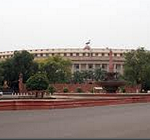India’s new government will present the Union Budget on 10 July 2014.
Amit Bhandari, Energy and Environment Fellow at Gateway House, comments on the need to invest in diversification of energy imports and development of energy partnerships with neighbouring countries.
Statement:
“The bulk of India’s crude oil is imported from West Asia, mainly from Saudi Arabia, Iraq, Kuwait, and Iran. India’s crude oil supplies are vulnerable to disruptions caused by political instability, such as in Iraq, which raise the oil import bill. The new budget needs to take into account such risks and provide for investments to diversify energy imports.
India needs to shift its energy mix away from crude oil and its derivatives diesel and petrol, and move towards natural gas. Natural gas is more economical and environmentally friendly. It can be purchased as LNG from more politically stable countries such as Russia, U.S, Australia, Canada and Mozambique. India already has the infrastructure to import 25 million tonnes of LNG per year, which is currently under-utilised. The auto industry in India can be nudged towards the production of more CNG-driven vehicles which can help reduce energy bills and ensure supply stability.
The budget also needs to provide for more foreign aid to fund mutually beneficial energy projects in neighbouring countries. Bhutan, for instance, has been able to develop 1,420 megawatt (mw) of hydropower plants with India’s help. Electricity (to India) is Bhutan’s single largest export and this power trade has created a stable, beneficial economic relationship. It has the potential to generate 24,000 mw of hydropower and it will be in India’s interests to help Bhutan develop this potential. Another neighbouring country which has tremendous potential to generate hydropower – 43,000 mw of it – is Nepal. By providing financial assistance to Nepal for hydropower projects and negotiating power purchase agreements to buy the surplus generated post-completion, India can further diversify its energy sources and reduce its import bill.”
For more information or interview requests, please contact Reetika Joshi at joshi.reetika@gatewayhouse.in or outreach@gatewayhouse.in


